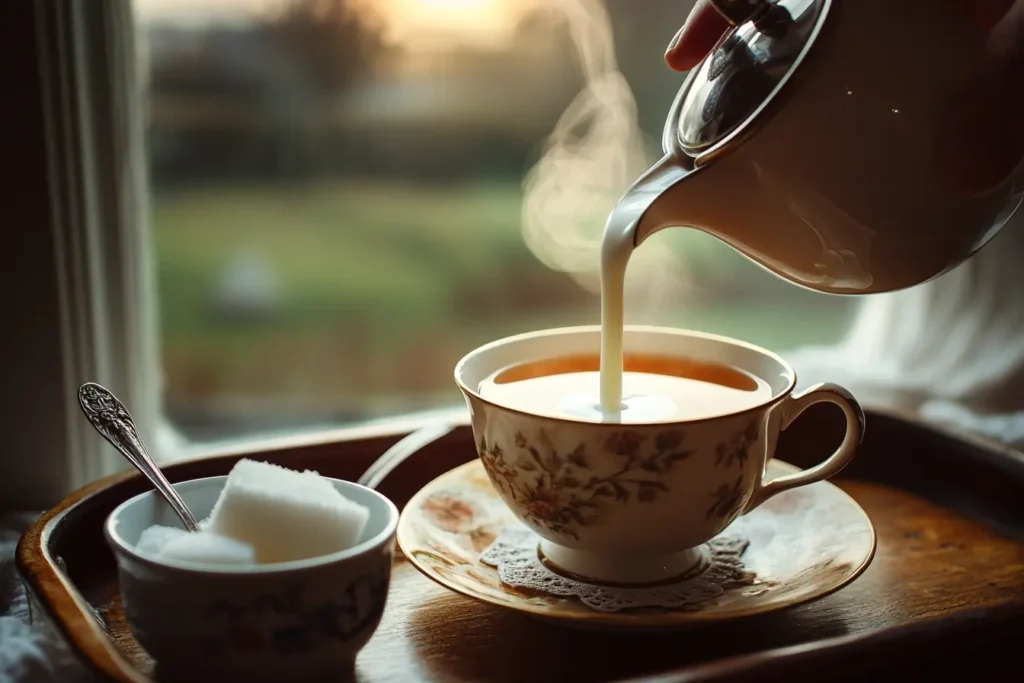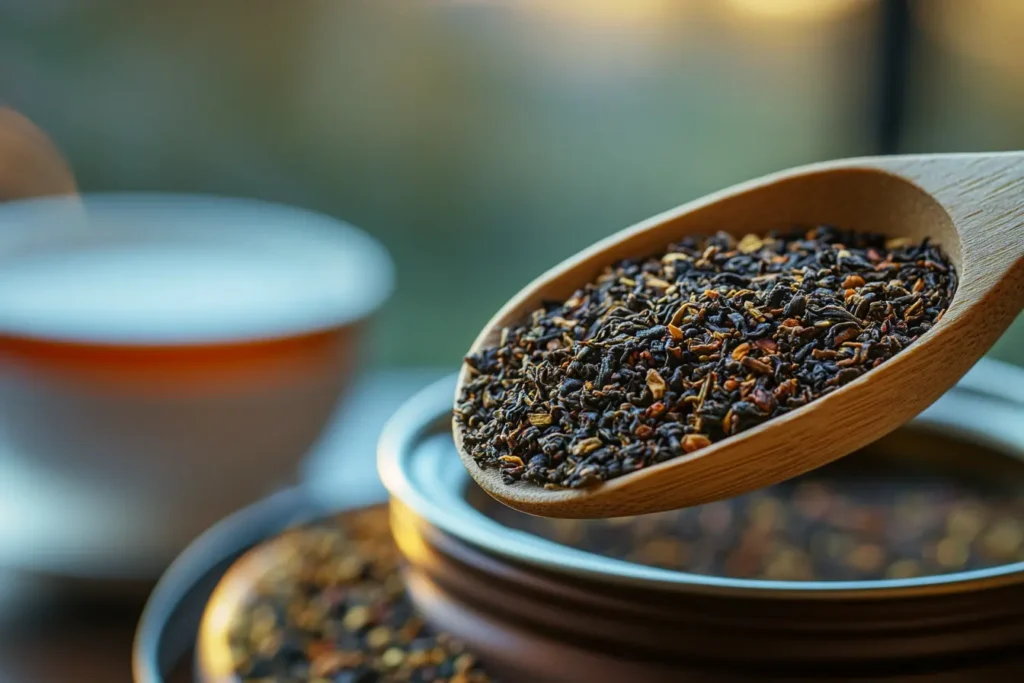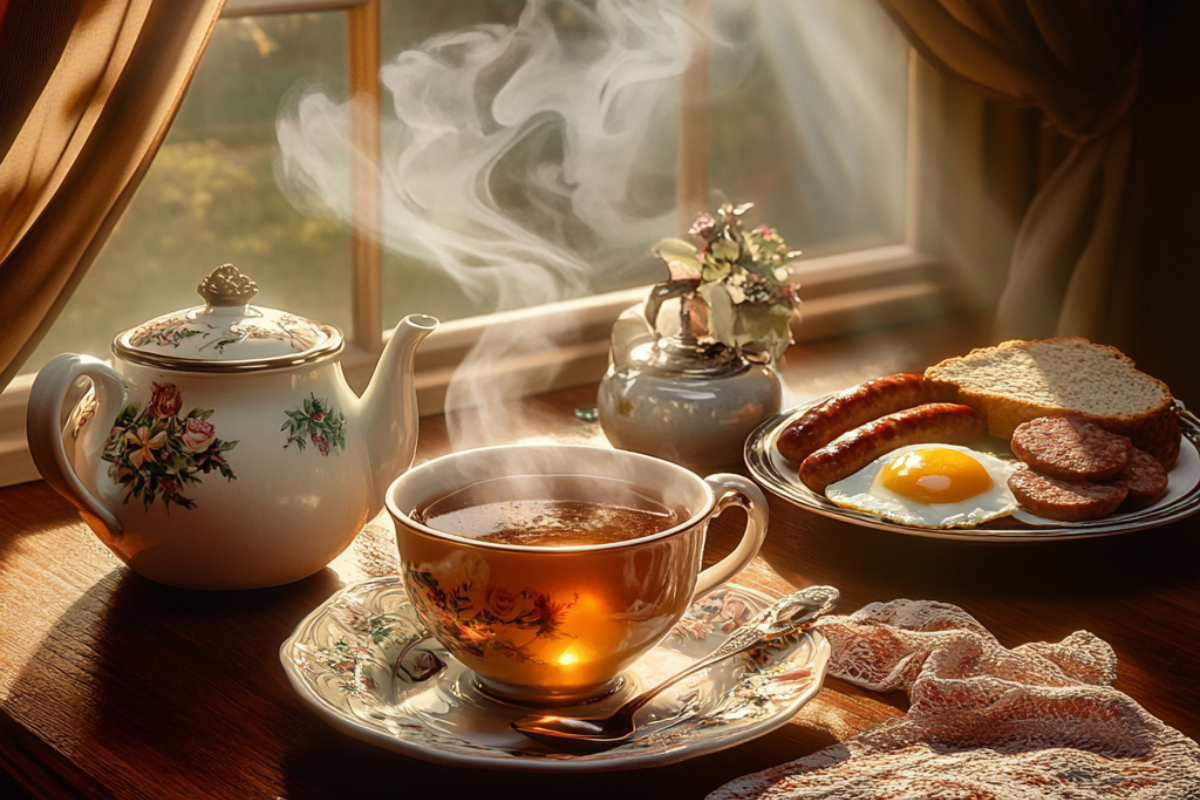Irish Breakfast Tea is loved for its bold flavor and rich heritage. It holds a special place in tea culture. Whether you’re a tea expert or beginner, this tea offers something unique. It’s more than just a morning drink.
This guide covers its origins, brewing tips, and health benefits. Learn everything about this beloved and iconic beverage.
What is Irish Breakfast Tea?
Origins and History
Irish Breakfast Tea, often revered as a staple in Irish households, boasts a long-standing history rooted in the tea trade’s golden era. The blend originated during the 19th century when Ireland’s love for tea soared. This robust concoction typically features Assam tea at its core, offering a malty, full-bodied flavor cherished by millions.
Tea-drinking became synonymous with daily life in Ireland, shaping a culture of warmth, hospitality, and tradition. By the late 1800s, Irish tea companies began crafting distinctive breakfast blends tailored to complement hearty Irish meals. Over time, Irish Breakfast Tea grew into an internationally beloved brew.
Traditional Composition
This black tea blend primarily combines Assam, Ceylon, and occasionally Kenyan teas, creating a dynamic flavor profile. Its hallmark characteristics include a deep, amber hue and a bold, malty taste, making it the perfect morning beverage.
The high-quality Assam leaves lend richness and strength, while Ceylon tea contributes a subtle brightness, balancing the flavor spectrum. Sometimes, other regional teas are blended in to enhance the overall complexity, ensuring each sip feels like a celebration of Ireland’s tea heritage.
Cultural Significance in Ireland
Tea-drinking holds a revered place in Irish culture, often symbolizing community and connection. Whether shared during family gatherings or as part of a leisurely breakfast, Irish Breakfast Tea reflects Ireland’s emphasis on tradition and togetherness.
This tea is also a star player in the quintessential Irish breakfast, paired alongside warm, satisfying meals. It’s not just a drink—it’s a comforting ritual steeped in history and camaraderie.
Characteristics of Irish Breakfast Tea
Flavor Profile

The flavor of Irish Breakfast Tea is nothing short of robust, making it a perfect companion for kickstarting your day. Dominated by the malty richness of Assam tea, this blend carries a hearty, full-bodied taste that’s both invigorating and comforting.
What truly sets it apart is its well-rounded character—bold enough to hold its own with milk and sugar, yet smooth enough to enjoy plain. You might notice subtle notes of sweet honey or earthy undertones, depending on the specific blend. This dynamic flavor profile makes it versatile, whether paired with a traditional Irish meal or sipped on its own.
Caffeine Content
When it comes to caffeine, Irish Breakfast Tea provides just the right amount of energy to jumpstart your morning without overwhelming your system. Packed with black tea leaves like Assam and Ceylon, the caffeine level generally ranges between 40-70 milligrams per cup, making it a gentler option compared to coffee.
It strikes the perfect balance: energizing enough to banish morning grogginess yet mellow enough to avoid the jitters that can come from a strong espresso. For those with caffeine sensitivities, enjoying this tea in moderation or opting for decaffeinated versions ensures you don’t miss out on its hearty goodness.
Appearance and Aroma
Irish Breakfast Tea is as visually appealing as it is flavorful. When brewed, it produces a deep amber or reddish-brown hue, reflecting its rich and intense character. The liquor’s depth signals the strength and complexity waiting in every sip.
Its aroma is equally captivating, with a warm, malty scent often accompanied by subtle floral or woody notes. As the steam rises, it fills the room with a sense of coziness and nostalgia—an olfactory prelude to the delicious taste awaiting you.
By combining bold flavors, moderate caffeine, and a sensory experience that delights both the eyes and nose, Irish Breakfast Tea continues to charm tea lovers across the globe.
Nutritional Subheading
This table provides approximate nutritional information for Irish Breakfast Tea brewed without any additions. Adjust values based on added milk, sugar, or alternatives.
| Nutrient | Amount |
|---|---|
| Calories | 1 kcal |
| Carbohydrates | 0 g |
| Protein | 0 g |
| Fat | 0 g |
| Sodium | 1 mg |
| Caffeine | 20–40 mg |
| Polyphenols (antioxidants) | ~150 mg |

Brewing and Serving Irish Breakfast Tea
Brewing Techniques
Traditional Method
Brewing Irish Breakfast Tea the traditional way emphasizes simplicity and respect for the tea’s robust nature. Begin by boiling fresh water and pre-warming your teapot or cup for an even infusion. Add one teaspoon of loose tea leaves per cup or use a high-quality tea bag.
Pour the freshly boiled water over the tea, allowing it to steep for 4-5 minutes. The longer steep time ensures a full-bodied brew with deep flavors. For an authentic touch, serve the tea piping hot in a porcelain cup. This method brings out the hearty, malty notes that define the classic experience.
Modern Variations
In today’s fast-paced world, brewing Irish Breakfast Tea has adapted to various lifestyles. Using an electric kettle with temperature settings or a tea infuser can streamline the process without sacrificing flavor.
For cold brew enthusiasts, steeping the tea in chilled water for 6-8 hours offers a refreshing take on this beloved blend. Experimenting with flavored syrups or spices like cinnamon can also add a modern twist while preserving the tea’s strong character.
Serving Suggestions
With Milk and Sugar
Traditionally, Irish Breakfast Tea is enjoyed with a splash of milk and a touch of sugar. The creaminess of the milk tempers the tea’s boldness, while sugar adds a hint of sweetness, creating a harmonious balance. This classic combination highlights the tea’s malty richness and deep flavor profile.
Alternative Additions
For those seeking a lighter approach, adding honey or a slice of lemon can provide a delightful variation. These alternatives subtly enhance the tea’s natural flavors without overpowering its robust essence. Non-dairy milk options like oat or almond milk work wonderfully for those avoiding dairy.
Pairing with Food

Traditional Irish Breakfast
A steaming cup of Irish Breakfast Tea pairs perfectly with a traditional Irish breakfast, which typically includes eggs, sausage, and soda bread. The tea’s strength complements the hearty flavors of the meal, creating a satisfying and balanced experience.
Contemporary Pairings
Beyond traditional fare, this tea pairs well with a variety of foods. From buttery pastries like scones to savory dishes like quiche, its versatility shines. Even a simple plate of toast with jam becomes elevated when enjoyed alongside a well-brewed cup of Irish Breakfast Tea.
These brewing and serving suggestions ensure that every cup of Irish Tea is a delightful journey, whether you stick to tradition or explore modern innovations.
Comparisons with Other Breakfast Teas
Irish Breakfast Tea vs. English Breakfast Tea
While Irish Breakfast Tea and English Breakfast Tea both belong to the family of robust black tea blends, they have distinct differences that set them apart.
Irish Tea is renowned for its malty flavor, largely due to the heavy use of Assam tea in its blend. Its bold character makes it particularly well-suited to pairing with milk and hearty breakfasts. On the other hand, English Breakfast Tea features a milder, smoother profile, often incorporating a balanced mix of Assam, Ceylon, and sometimes Chinese teas. This creates a lighter cup with subtle sweetness and floral undertones.
While both teas are breakfast staples, Irish Tea appeals to those who prefer a stronger, more invigorating flavor, whereas English Breakfast Tea caters to those seeking a gentler, more refined taste.
Irish Breakfast Tea vs. Scottish Breakfast Tea
Though less globally recognized, Scottish Breakfast Tea is another robust option worth exploring. It typically features a darker and even more intense flavor than its Irish counterpart. The blend often includes Assam alongside Kenyan and other strong black teas, resulting in a brew that’s rich and slightly smoky.
Irish Tea, while strong, remains smoother and slightly sweeter, making it more versatile for a wider audience. Scottish blends, by contrast, are often designed to stand up to the cold, damp climate of Scotland, offering an almost rustic depth of flavor.
The choice between these two blends often boils down to personal preference: Irish Tea is bold yet approachable, while Scottish Breakfast Tea is for those who crave a bolder, earthier profile.
Regional Preferences and Blends
The world of breakfast teas reflects the diversity of regional tastes. Irish Breakfast Tea is a household staple in Ireland, typically brewed strong and served with milk. Its bold flavor resonates with the hearty Irish cuisine and lifestyle.
Meanwhile, in England, lighter blends like English Breakfast Tea are more commonly enjoyed. Scottish blends, with their intense and dark profiles, are often favored in Scotland’s cooler regions. Outside the UK, variations like American Breakfast Tea may include additional flavorings or blends tailored to local palates.
Regional preferences are also influenced by the availability of tea leaves. While Assam and Ceylon dominate Irish and English blends, the inclusion of Kenyan tea in Scottish blends adds a unique depth. These variations make exploring breakfast teas a journey into the culture and history of each region.
Health Aspects of Irish Breakfast Tea
Antioxidant Properties
Irish Tea isn’t just a delicious beverage; it’s also a source of powerful antioxidants. As a black tea blend, it contains polyphenols like theaflavins and catechins, which are known for their ability to combat oxidative stress.
These antioxidants play a crucial role in neutralizing free radicals in the body, potentially reducing inflammation and protecting cells from damage. Regular consumption of black tea, including Irish Breakfast Tea, may contribute to overall wellness by supporting the immune system and promoting healthier skin.
Potential Health Benefits
Cardiovascular Health
Drinking Irish Tea can be beneficial for your heart. The flavonoids found in black tea are linked to improved cardiovascular health, including lower blood pressure and reduced LDL cholesterol levels. Studies suggest that these compounds help enhance blood vessel function and decrease the risk of heart disease.
Pairing this tea with a balanced diet can amplify its heart-friendly effects, making it a smart choice for those looking to support their cardiovascular system naturally.
Digestive Health
The tannins in Irish Breakfast Tea may offer digestive benefits by soothing the digestive tract and supporting gut health. These natural compounds help regulate intestinal activity, potentially easing discomfort from minor digestive issues.
Additionally, the caffeine in black tea can stimulate digestion, making it a gentle aid for post-meal sluggishness. However, moderation is key, as overconsumption might lead to stomach sensitivity in some individuals.
Considerations for Consumption
Caffeine Sensitivity
Although this kind of Tea contains less caffeine than coffee, its levels may still pose a challenge for those sensitive to stimulants. Drinking it in moderation and avoiding it late in the day can help mitigate issues like restlessness or disrupted sleep.
For caffeine-conscious drinkers, opting for decaffeinated versions ensures you can enjoy the tea’s rich flavor without the stimulating effects.
Additives and Caloric Content
While the tea itself is naturally calorie-free, common additions like milk and sugar can increase its caloric value. For a lighter option, consider using honey, plant-based sweeteners, or non-dairy milk.
Being mindful of your serving style ensures that Breakfast Tea remains a healthy part of your daily routine, delivering its benefits without unintended caloric intake.
By combining antioxidant power, heart and digestive health perks, and thoughtful consumption practices, Irish Tea proves to be not only a flavorful choice but also a beneficial addition to a balanced lifestyle.
Frequently Asked Questions
What makes Irish Breakfast Tea unique?
Irish Breakfast Tea stands out for its bold, malty flavor and rich composition, primarily featuring Assam tea. This hearty black tea blend is crafted to complement robust meals, making it a favorite for breakfast. Its strong flavor profile, combined with its cultural significance in Ireland, makes it a distinct choice among breakfast teas.
Can I drink Irish Breakfast Tea without milk?
Absolutely! While traditionally enjoyed with milk and sugar, Irish Breakfast Tea is versatile enough to be savored plain. Its naturally robust and malty notes shine even without additives, offering a smooth yet strong cup that caters to all preferences.
How does the caffeine content compare to coffee?
The caffeine content in Irish Tea is significantly lower than in coffee, ranging from 40-70 milligrams per cup compared to 90-120 milligrams in coffee. This makes it a gentler choice for those seeking a morning energy boost without the intensity of coffee’s jitters.
Are there decaffeinated versions available?
Yes, decaffeinated Irish Tea is available for those sensitive to caffeine. These versions retain the tea’s bold flavor while significantly reducing its stimulant content, allowing you to enjoy the comforting taste at any time of the day.
What is the best time to drink Irish Breakfast Tea?
True to its name, Irish Tea is most commonly enjoyed in the morning, pairing beautifully with a hearty breakfast. However, its versatility allows it to be enjoyed throughout the day as a pick-me-up or even as an afternoon treat.
How should I store Irish Breakfast Tea?
To preserve its freshness and flavor, store Irish Breakfast Tea in an airtight container, away from light, heat, and moisture. A cool, dark pantry is ideal. Avoid storing it near strong-smelling items, as tea can absorb odors, potentially altering its taste.
Irish Breakfast Tea is more than just a beverage—it’s a cultural icon, a source of comfort, and a flavorful tradition cherished by tea lovers worldwide. From its bold, malty flavor to its rich history and health benefits, it offers a unique experience that satisfies the palate and nourishes the soul.
Whether you enjoy it brewed strong and paired with a hearty meal or savor its versatility in modern variations, Irish Breakfast Tea delivers a delightful blend of strength and warmth. Its adaptability, from plain cups to creative pairings, makes it a timeless favorite for every occasion.
So, the next time you’re looking to start your day with something invigorating or explore a new tea experience, let Irish Breakfast Tea be your go-to choice. It’s more than just tea—it’s a celebration of flavor, tradition, and well-being in every cup.
Conclusion
Irish Breakfast Tea is more than just a beverage—it’s a cultural icon, a source of comfort, and a flavorful tradition cherished by tea lovers worldwide. From its bold, malty flavor to its rich history and health benefits, it offers a unique experience that satisfies the palate and nourishes the soul.
Whether you enjoy it brewed strong and paired with a hearty meal or savor its versatility in modern variations, Irish Breakfast Tea delivers a delightful blend of strength and warmth. Its adaptability, from plain cups to creative pairings, makes it a timeless favorite for every occasion.
So, the next time you’re looking to start your day with something invigorating or explore a new tea experience, let Irish Breakfast Tea be your go-to choice. It’s more than just tea—it’s a celebration of flavor, tradition, and well-being in every cup.


2 thoughts on “What is Irish Breakfast Tea? A Complete Guide to Flavor, Brewing, and Benefits”